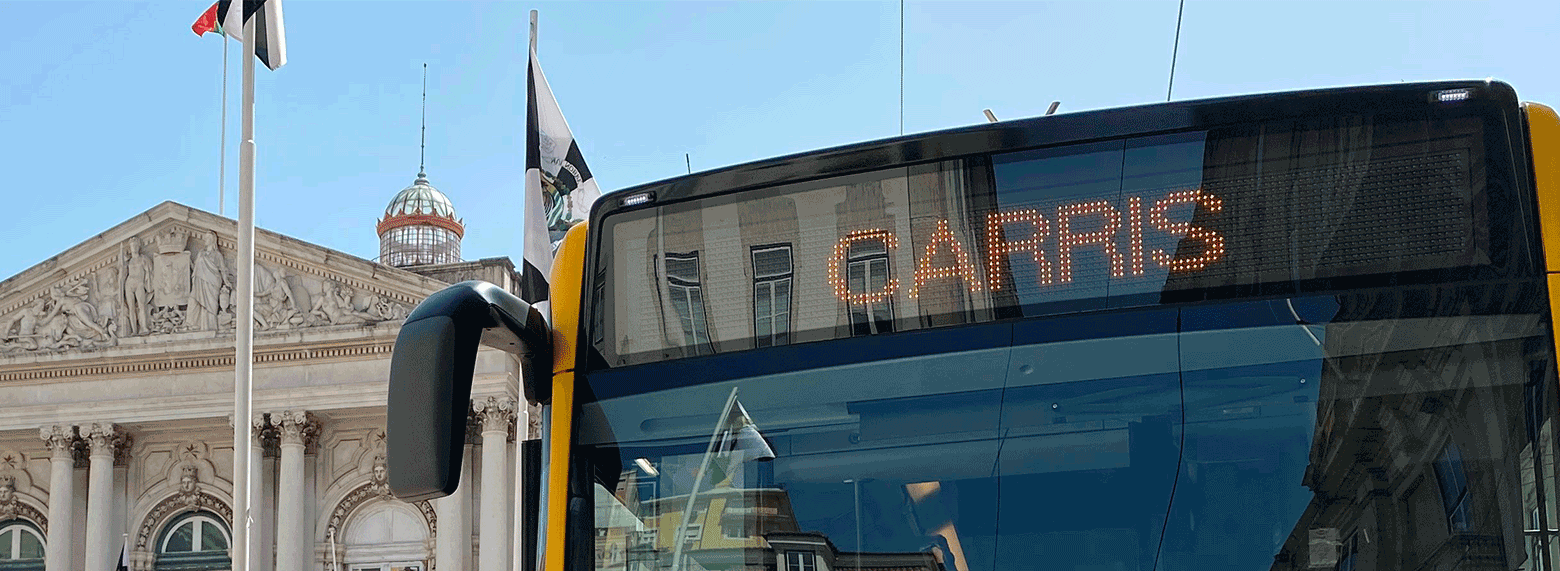Mercedes Benz Citaro NGT
European Funding

Renewal of the bus fleet with superior environmental and energy performance buses Project
Name | Renewal of the bus fleet with superior environmental and energy performance buses
Project code | POSEUR-01-1407-FC-000019
Main aim | To support the transition to a low-carbon economy
Area of intervention | Lisbon Metropolitan Area
Beneficiary | Companhia Carris de Ferro de Lisboa, E.M., S.A.
Date of approval | 10/07/2017
Start date | 01/07/2017
End date | 31/03/2021
Total eligible cost | EUR 14.717.441,33
European Union financial support | Cohesion Fund - EUR 11.636.483,72
Aims, activities and expected results | The aim of the operation is to:
- Leverage an integrated mobility policy in terms of transport, public space, parking and
policing;
- To provide the Lisbon Metropolitan Area with a more accessible, more reliable, more comfortable
and more sustainable public transport system;
- To attract more passengers to public transport, ensuring a transfer from individual transport to
public transport and active mobility.
To this end, CARRIS intends to acquire 180 new buses powered by more efficient energy sources
and with superior environmental and energy performance, such as Compressed Natural Gas (CNG)
and electricity. In addition, it will be investing in the construction and installation of the support
system for the operation of this new fleet. Thus, it will establish a CNG supply infrastructure in the
Miraflores Complex, in Oeiras, and an electric charging station located in Lisbon.
CARRIS intends to achieve the following goals with the implementation of this operation:
- A reduction in overall pollutant emissions from its fleet of public service vehicles;
- A reduction in greenhouse gas emissions through the 180 new vehicles in its fleet;
- Primary energy savings compared to the primary energy used before carrying out the operation to replace the vehicles with 100% electric-powered buses, as well as other energy savings.
|
Designation |
Unit |
Approved (Goal) |
Executed (accumulated) |
|---|---|---|---|
|
Estimated annual decrease in greenhouse gas emissions |
Tonnes of CO2 equivalent |
334,71 |
334,71 |
|
Energy savings in projects supported in the transport sector |
tep |
256,58 |
256,58 |
|
Cleaner energy supply stations for public transport fleets |
Number |
17 |
17 |
|
Cleaner public transport vehicles |
Number |
180 |
180 |
|
Greenhouse Gas Emissions (GHG) avoided |
Tonnes of CO2 equivalent |
334,71 |
3803,56 |
|
Primary energy saving in public transport fleets as part of the operation |
% |
0,73 |
0,79 |
Fotos
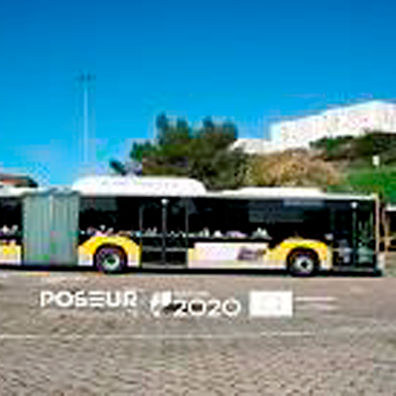
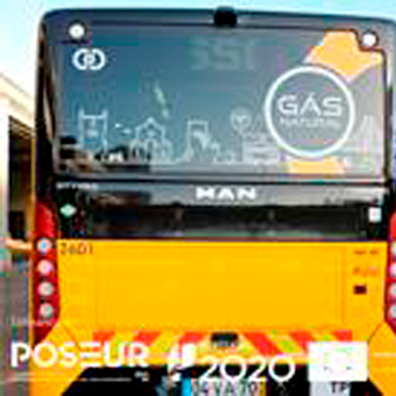
MAN 18.310 HOCL-NL
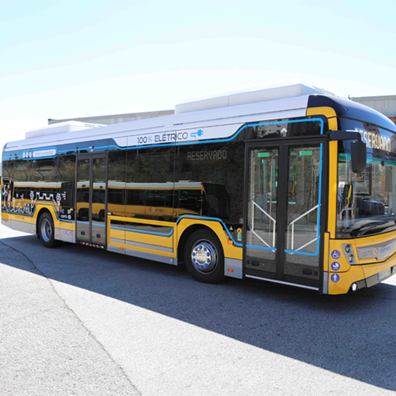
Caetano E.CITY GOLD
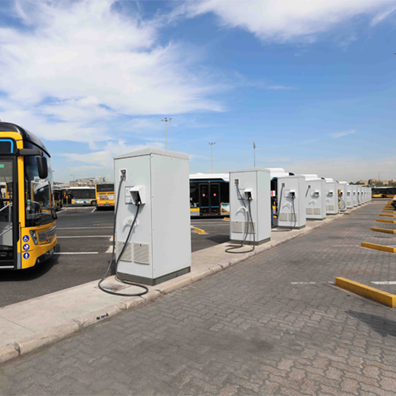
Electric charging station
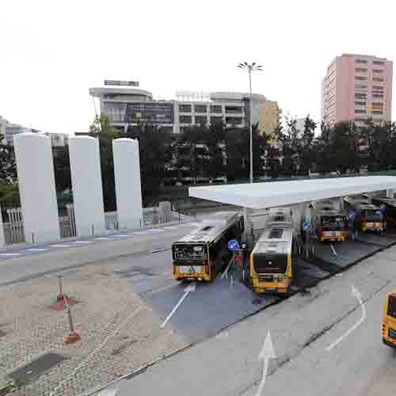
Natural gas filling station
Links
Installation of energy efficiency and driving data management modules
Name | Installation of energy efficiency and driving data management modules
Project code | POSEUR-01-1407-FC-000030
Main aim | To support the transition to a low-carbon economy
Area of intervention | Lisbon Metropolitan Area
Beneficiary | Companhia Carris de Ferro de Lisboa, E.M., S.A.
Date of approval | 30/06/2018
Start date | 01/12/2018
End date | 31/03/2021
Total eligible cost | EUR 243.100,34
European Union financial support | Cohesion Fund – EUR : 97.240,14
Aims, activities and expected results | The aim of the operation is to:
- Consolidate a more sustainable energy consumption standard through investment in lowcarbon and efficiency at all levels, including in the transport area;
- Promote efficient fleets, as well as the implementation of mobility plans and consumption
rationalisation measures on public transport;
- Contribute to local low-carbon measures, particularly the development of local low-carbon
plans, low-carbon measures in urban requalification and support for sustainable mobility
equipment and infrastructures, in order to improve competitiveness and the associated services.
To this end, CARRIS intends to acquire 100 new energy efficiency modules and 195 driver graphical consoles, as well as a technological upgrade of 95 modules previously installed (given that the current solutions don’t provide for any real-time interaction with the drivers).
CARRIS intends to achieve the following goals with the implementation of this operation:
- Savings in primary energy compared to the primary energy used before carrying out the operation to
replace the vehicles with 100% electric-powered buses, as well as other energy savings;
- A reduction in greenhouse gas emissions.
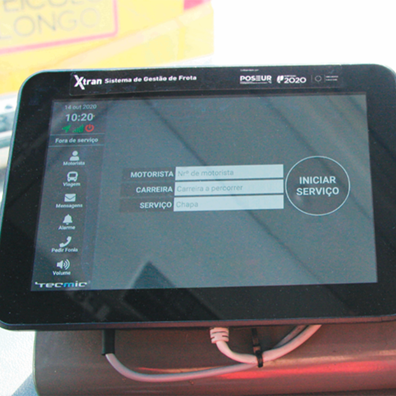
XtraN console
Renewal of the CARRIS fleet of public transport vehicles: Clean Buses 2020
Name | Renewal of the CARRIS fleet of public transport vehicles: Clean Buses 2020
Project code | POSEUR-01-1407-FC-000053
Main aim | Supporting the transition to a low-carbon economy in all sectors
Area of intervention | Lisbon Metropolitan Area
Beneficiary | Companhia Carris de Ferro de Lisboa, E.M., S.A.
Date of approval | 26/12/2018
Start date | 06/08/2019
End date | 21/12/2023
Total eligible cost | EUR 3.578.370,00
European Union financial support | EUR 2.839.825,02
National/regional public financial support | EUR 558.103,99
Aims, activities and expected results | The aim of the operation is to:
- Leverage an integrated mobility policy in terms of transport, public space, parking and policing;
- To provide the Lisbon Metropolitan Area with a more accessible, more reliable, more comfortable and more sustainable public transport system;
- To attract more passengers to public transport, ensuring a transfer from individual transport to public transport and active mobility.
To this end, CARRIS intends to acquire 15 new buses powered by more efficient energy sources and with superior environmental and energy performance, such as Compressed Natural Gas (CNG) and electricity.
It will also be investing in the construction and installation of the support systems for the operation of the new CNG-powered fleet at Alta de Lisboa Station in Lisbon, as well as holding communication and awareness campaigns for the target public.
CARRIS intends to achieve the following goals with the implementation of this operation:
- A reduction in overall pollutant emissions from its fleet of public service vehicles;
- A reduction in greenhouse gas emissions through the 15 new vehicles in its fleet;
- Primary energy savings compared to the primary energy used before carrying out the operation to replace the vehicles with 100% electric-powered buses, as well as other energy savings.
Purchase of new articulated trams for line 15E
Project name | Acquisition of rolling stock, namely articulated trams, for use on line 15EProject code | PACS-FC-01344000
Main objective | To increase CARRIS's capacity to respond to demand for public passenger transport along the axis of the riverside area of Lisbon using sustainable vehicles with no pollutant emissions.
Region of intervention | Lisbon Metropolitan Area
Programme | Thematic Programme for Climate Action and Sustainability - Cohesion Fund
Beneficiary | Companhia Carris de Ferro de Lisboa, E.M., S.A.
Approval date | 27-08-2024
Start date | 28-07-2023
Completion date | 31-12- 2024
Total eligible cost | 34.679.243,99 € EUR
European Union financial support | Cohesion Fund - 29.477.357,39 EUR
Objectives, activities and expected results | The operation aims to:
This operation aims to reinforce the public service tram fleet of Companhia Carris de Ferro de Lisboa, E.M., S.A. (CARRIS), the main surface public transport operator in the city of Lisbon. The aim of this initiative is to increase CARRIS's capacity to meet existing demand along Lisbon's riverside axis and to support the extension of this high-capacity public transport system both to the west (to Cruz Quebrada) and to the east (initially to Santa Apolónia), always with the ambition of contributing to the decarbonisation and energy transition of Lisbon's transport system.
This investment is in line with the objectives and measures defined in the PAMUS-AML, the Lisbon city strategy defined through MOVE2030 and the PNI 2030, seeking to boost a new and/or reinforced supply of high-capacity public transport by light rail along Lisbon's riverside arc, part of which will take place on a reserved channel. The entry into service of new rolling stock is essential for improving public transport along this canal, which has a high potential to recover passengers to the level they were at in 2019 and regain the growth momentum seen at the time. In fact, the acquisition of rolling stock will not only allow the current line 15E to operate exclusively by electric means (with the environmental benefits associated with this energy transition), but will also make it possible to reinforce operations on the current route, with more services and more seats.km, and to extend it to the west and east.
By carrying out this operation, CARRIS aims to achieve the following goals:
- Increase the number of annual tram line users;
- Put vehicles acquired for high-capacity passenger transport systems into service;
- Decrease greenhouse gas emissions annually;
- Increase the capacity of environmentally friendly rolling stock for collective public transport.
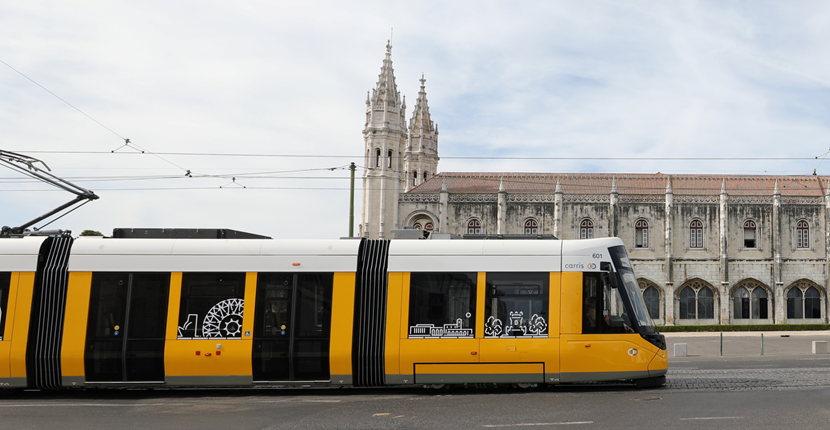
More information: Os novos elétricos da CARRIS

Decarbonisation of the CARRIS bus fleet
Project Name | Decarbonisation of the CARRIS bus fleet
Supporting Organisation | Environmental Fund
The ambition of this project is to continue the energy transition effort of the CARRIS bus fleet, in line with the need to increase the number of vehicles available for service and with the objectives of improving the environmental performance of the fleet, promoting its decarbonisation and reducing local pollutant emissions. It takes the form of the acquisition of 34 new electric buses for the CARRIS fleet, including the respective charging infrastructure, with a view to increasing the resources available to carry out its public transport service mission in the Lisbon Metropolitan Area (AML). These new vehicles include standard buses and mini buses.
The main objective of this operation is to expand the CARRIS fleet in order to help improve public transport services in AML, making them more attractive and competitive compared to individual transport. However, it is specifically intended that this fleet increase be achieved with vehicles that improve their environmental performance, using vehicles with zero local pollutant emissions, better energy efficiency and the potential to use energy produced solely from renewable sources. Thus, compared to operating with diesel vehicles, this investment will reduce GHG emissions by 1,741.63 tonnes of CO2eq per year and energy consumption by 481.30 tep per year.
In addition to these main objectives, the operation will help to reduce vehicle operating costs and meet the expectations of CARRIS clients in terms of improving the environmental performance of the bus fleet.
The investment to be made is €13,188,941.14 and receives financial support from the Recovery and Resilience Plan (RRP) and NextGeneration EU funds totalling €6,382,884.40.
